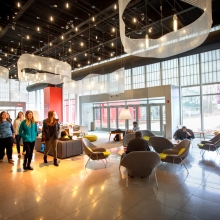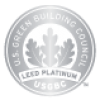Human Ecology Building
LEED Certified Platinum
Human Ecology Building earned LEED® Platinum — its highest rating for sustainable structures — making it the first building to achieve the distinction on the Cornell campus.
On the LEED-certified scorecard, Human Ecology Building scored 53 out of 69 possible points. For a full breakdown, review the report on the US Green Buildings Certification (USGBC) website.
| Sustainable Sites | Water Efficiency | Energy & Atmosphere | Materials & Resources | Indoor Environmental Quality | Innovation & Design | Regional Priority | |
|---|---|---|---|---|---|---|---|
| Points Earned | 11 / 14 | 4 / 5 | 13 / 17 | 7 / 13 | 13 / 15 | 4 / 4 | 1 / 1 |
Project Highlights
 Designed by Gruzen Samton Architects, the building faces Beebe Lake to the north and abuts Botanic Gardens to the east. The tucked-under parking garage greatly diminishes the building's environmental footprint, guarding against loss of vegetation, minimizing stormwater runoff, and preserving open natural areas. It earned additional points as a LEED sustainable site for its vast green roof with more than 25,000 native plantings and for sourcing one-quarter of building supplies within 500 miles of Ithaca and using recycled content for one-third of the building materials.
Designed by Gruzen Samton Architects, the building faces Beebe Lake to the north and abuts Botanic Gardens to the east. The tucked-under parking garage greatly diminishes the building's environmental footprint, guarding against loss of vegetation, minimizing stormwater runoff, and preserving open natural areas. It earned additional points as a LEED sustainable site for its vast green roof with more than 25,000 native plantings and for sourcing one-quarter of building supplies within 500 miles of Ithaca and using recycled content for one-third of the building materials.

The building also scored well for innovative measures to protect indoor environmental quality. Human ecology student interns researched and recommended eco-friendly Greenguard-certified furnishings with low emissions of volatile organic compounds.
Most notable of the building's environmental features is an extensive real-time energy usage monitoring system, allowing occupants to reduce their environmental impact. Building performance data is accessible through an online dashboard, giving researchers, students, and others a trove of information to analyze its efficiency or to launch energy conservation competitions for users.
LEED®, and its related logo, is a trademark owned by the U.S. Green Building Council® and is used with permission.

